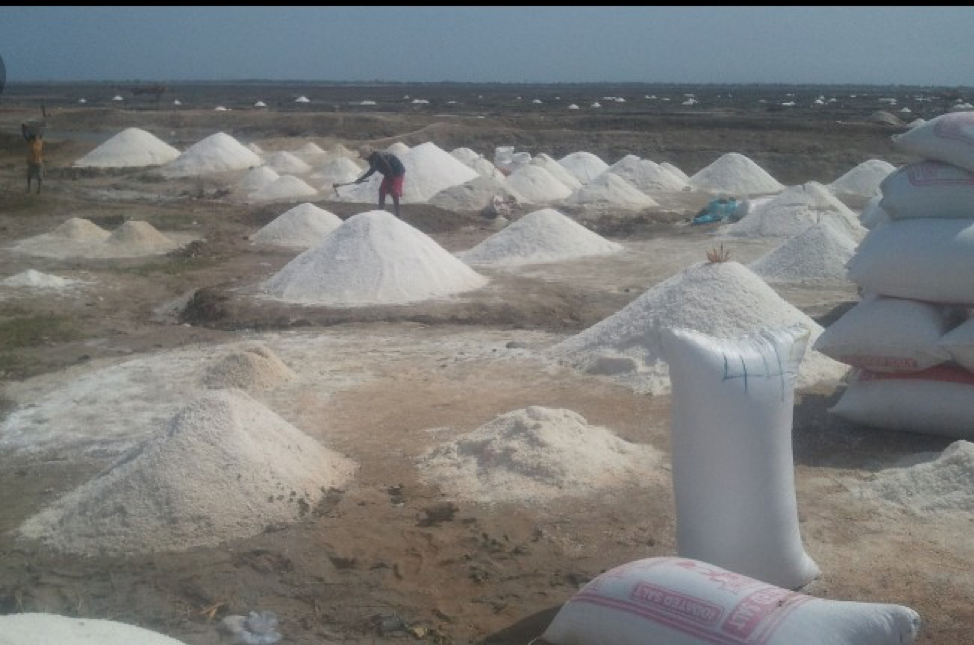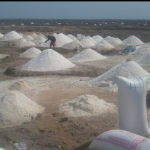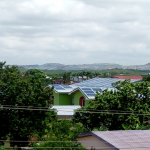MINING OF “WHITE GOLD” IN GHANA.

I sometimes try to imagine what it would have been like without seasoning for food. It would not be an easy experience at all. Food without salt or pepper ….my oh my….0 it really would be interesting. You may say what about those who don’t eat with any seasoning because of a health condition?… well if you may ask me… these people were actually eating it before they were asked not to. If you may ask them, they really won’t think twice about telling you how much they miss eating without such precautions. Sometimes some of these seasonings do add something to our lives nutritionally. Even though too much intake may cause our systems some problems they still are essential. One of such seasonings is; salt. Although salt is one of the most common ones, it’s very essential. It is also known as “white gold”.
Salt is used for taste, as a preservative, as a cleaning agent, remover of bad odor or scent, set colour in the textile industry, removal of toxins and as a dental remedy. These are even just a few of the uses of salt. It’s got so many home uses in and around the house especially in the kitchen. When we were growing up, we always wanted to be around the kitchen helping mummy cook. The few times we tried to help cut vegetables we ended up cutting ourselves with the knife. Mummy would make a salt solution and put the hurt finger in it. Though it hurts, the bleeding stops within a short time. We always thought mummy had a magic touch not knowing her secret was the salt. The interesting thing is that, salt is easy to come by as its readily available.
Salt could be refined or unrefined. The refined one is usually in powdered form. This type also has iodine added to it. Iodine is essential to our health and helps prevent the formation of goiter and any thyroid related problems. The unrefined one looks like white stone which has been broken down into small pieces. It has no iodine added to it. It’s common to find among the women who sell fish and are into preservation of fish. Locally known as “koobi” / “Kako” or “Momoni”. Thankfully some of the sellers of salt which is even unrefined have iodine with them and so when you want they add it to it for you. Formerly everyone used the “big stone-like” kind of salt. The problem people had with it apart from not being iodized was that, sometimes it might not melt properly and so the likelihood of you biting into it is very high. You seriously wouldn’t like the experience at all. That’s why a lot of people took to the iodized salt.
In Ghana, salt mining started somewhere in the 19th Century. It’s one major economic activity of people who live along the coastline aside fishing. Places where salt is mined in Ghana include; Keta Lagoon, the Songhor Lagoon, Densu Delta Area, Nyanyo Lagoon, Oyibi Lagoon, Amisa Lagoon, Benyah, Lagoon. Frankly speaking a lot of these mines are not mining up to their potential. Salt is renewable resource and it’s mining contributes annually to the economy. Through this sort of mining, people have been employed. Research has shown that Ghana has a great potential when it comes to salt production. Currently, the country has a potential of producing over two million tonnes but now produces two hundred and fifty thousand tonnes which shows that, we are under producing. Ghana exports to Cote D’Ivoire, Benin, Togo and Nigeria basically. Even with the presence of the largest salt production in West Africa which is Pambros Salt Production Limited, the country can do a lot more when it comes to salt mining. We have companies like; Crown Sea Salt, U2 Company Limited, Eldin Salt Mill Limited, Kinglako International Salt Industries Limited, Mingo Salt Limited, Kunad Salt, Abrobo Salt all into the salt manufacturing. The peak season for salt mining is November and April.
The industry faces some challenges which to me I think when tackled, would make things better and give salt mining a different phase. Most of the challenges has got to do with lack of capital. There’s no business venture which is not capital inclusive. A lot of these miners are local folks who need money to facilitate business. You might suggest getting a loan but unfortunately the interest charged on these loans are too huge. By the time business starts to pick up the money to be paid is just unimaginable. A lot of the times, they are not even granted the loan at all. There’s also a problem with the acquisition of land for mining. Some of the places of mining have their traditional leaders not being willing to give the land out to companies who are interested. Even if they allow, they give so many rules and end up limiting the companies in their production. There’s also a problem which has to do with obsolete production technology. As at now the method used in Ghana for salt mining is the solar evaporation. Meanwhile there are so many other cost effective and productive methods which can be adopted. Everything seems to be labour inclusive. Some of the work people do can be channeled to getting the right technology to handle it. This would move production higher and make things better.
With a better look at the salt production industry in Ghana, it’s obvious that the potential is bigger than the reality. There’s actually a lot that this sector can contribute to the economy and nation building. Investment in this are to boost what’s being done can go a long way to getting to make certain chemicals which historically West Africa can’t produce. Country like Nigeria which make a lot of imports of salt for the Brazil would depend solely on Ghana, if Ghana is able to produce the exact tonnes they need and even more.










